Attached files
| file | filename |
|---|---|
| EX-99.3 - EXHIBIT 99.3 - Ault Global Holdings, Inc. | ex99_3.htm |
| EX-99.1 - EXHIBIT 99.1 - Ault Global Holdings, Inc. | ex99_1.htm |
| 8-K - Ault Global Holdings, Inc. | r7162028k.htm |
Exhibit 99.2
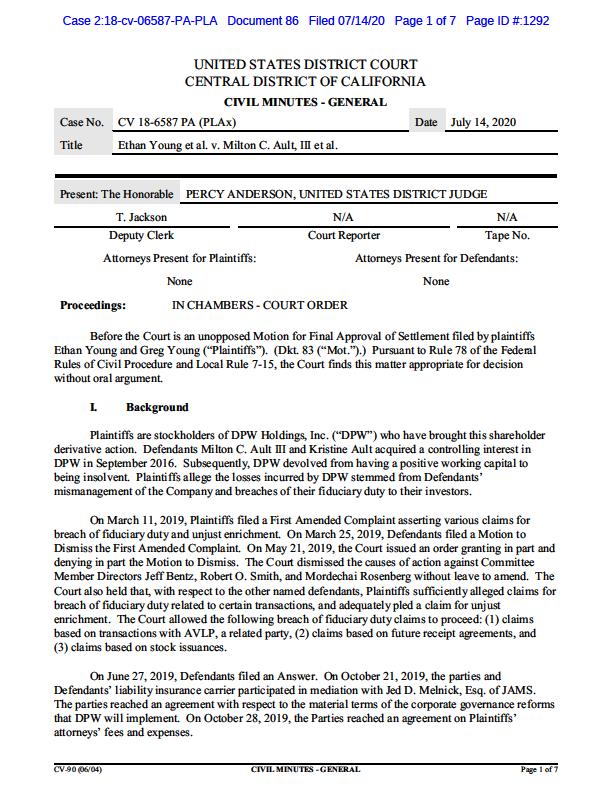
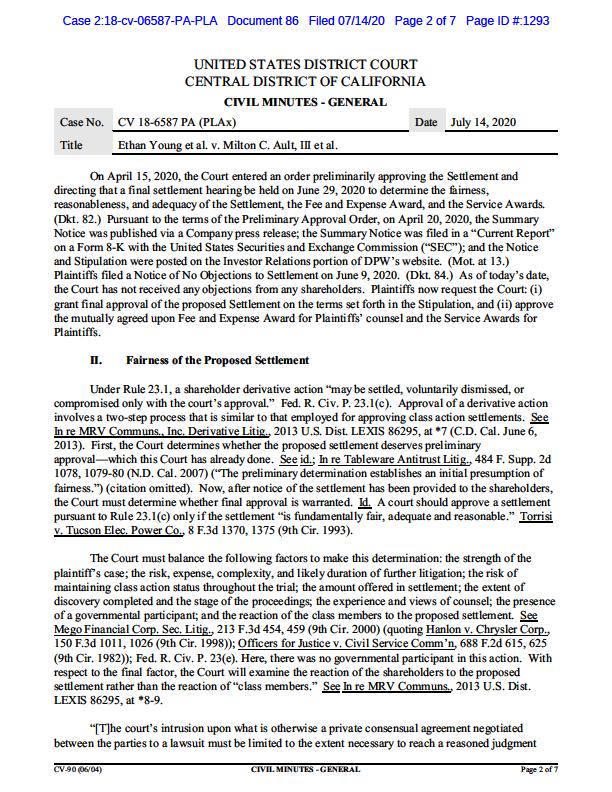
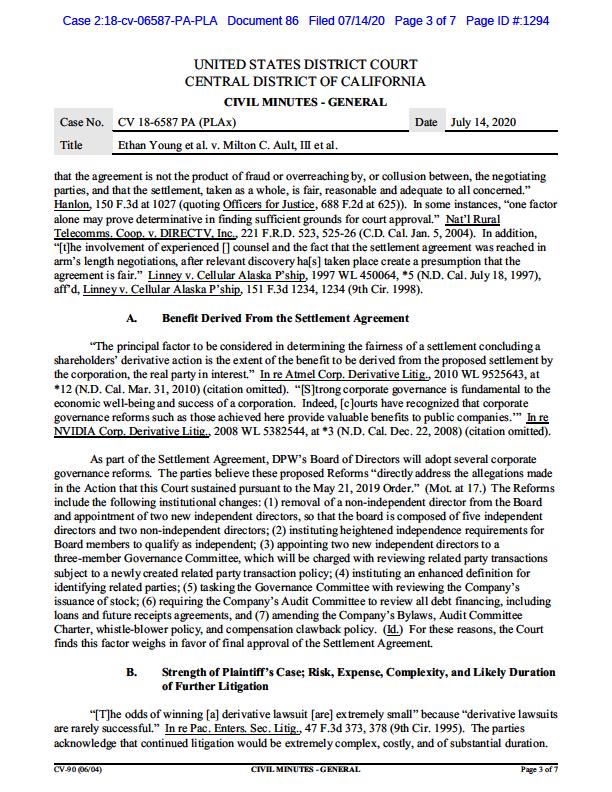
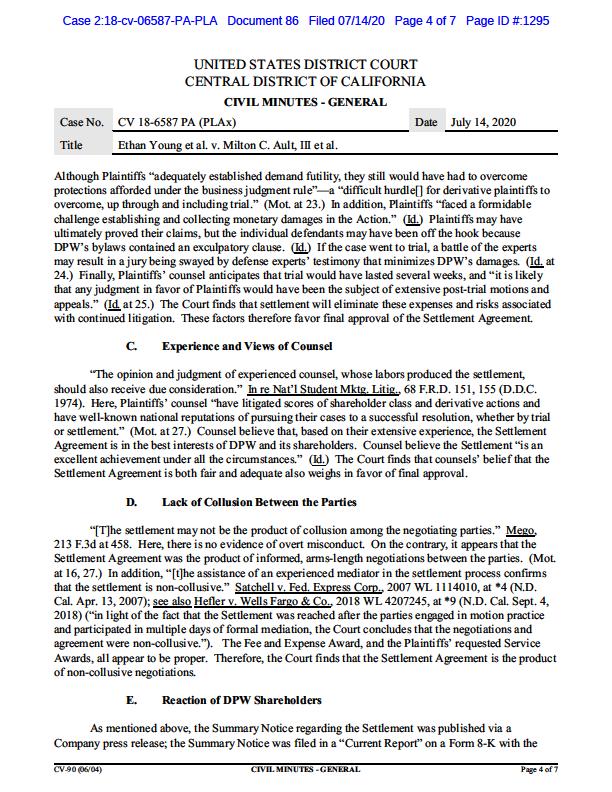
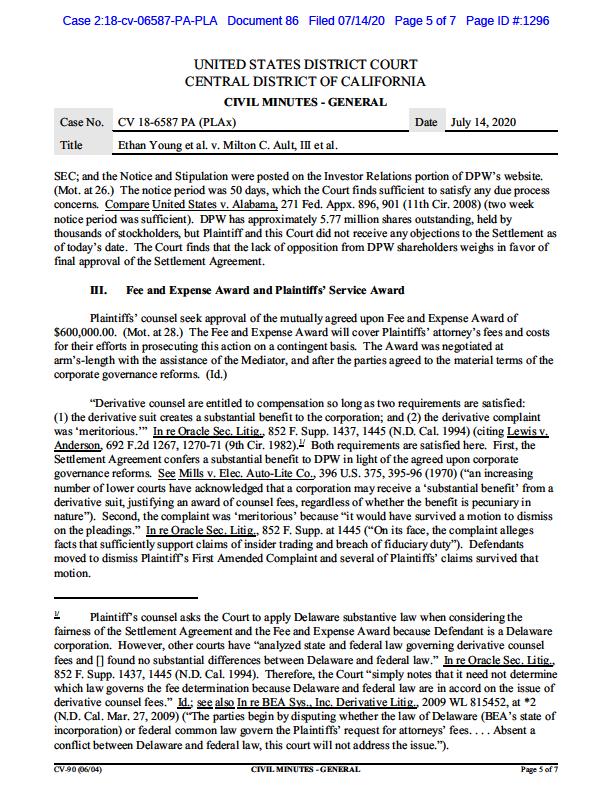
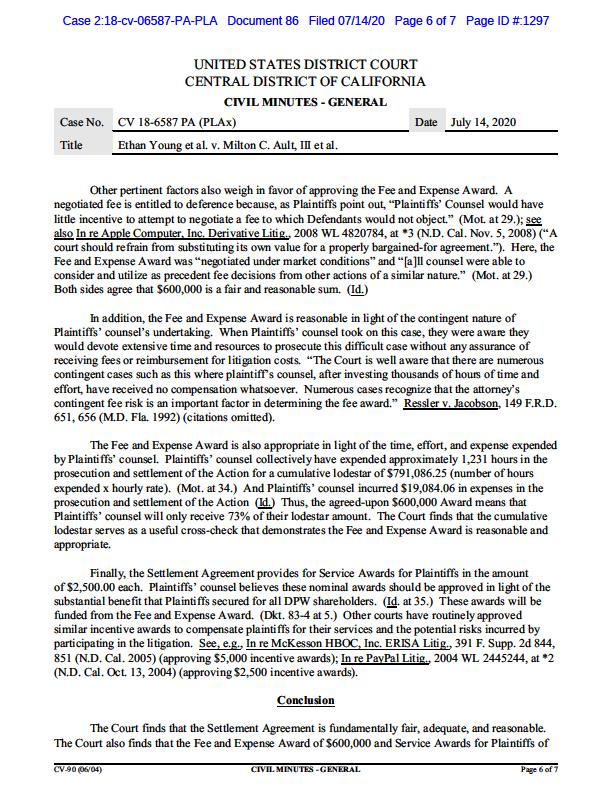
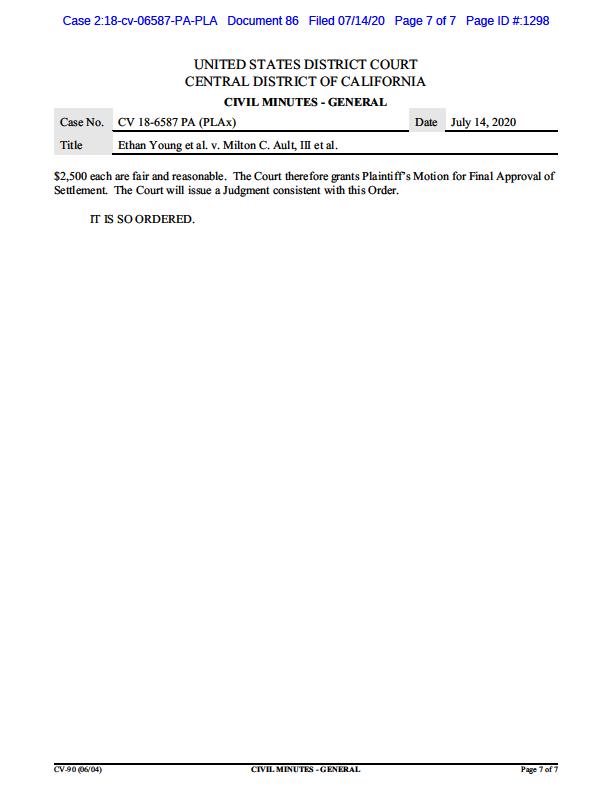
UNITED STATES DISTRICT COURT CENTRAL DISTRICT OF CALIFORNIA CIVIL MINUTES - GENERAL Case No. CV 18-6587 PA (PLAx) Date July 14, 2020 Title Ethan Young et al. v. Milton C. Ault, III et al. Present: The Honorable PERCY ANDERSON, UNITED STATES DISTRICT JUDGE T. Jackson N/A N/A Deputy Clerk Court Reporter Tape No. Attorneys Present for Plaintiffs: Attorneys Present for Defendants: None None Proceedings: IN CHAMBERS - COURT ORDER Before the Court is an unopposed Motion for Final Approval of Settlement filed by plaintiffs Ethan Young and Greg Young (“Plaintiffs”). (Dkt. 83 (“Mot.”).) Pursuant to Rule 78 of the Federal Rules of Civil Procedure and Local Rule 7-15, the Court finds this matter appropriate for decision without oral argument. I. Background Plaintiffs are stockholders of DPW Holdings, Inc. (“DPW”) who have brought this shareholder derivative action. Defendants Milton C. Ault III and Kristine Ault acquired a controlling interest in DPW in September 2016. Subsequently, DPW devolved from having a positive working capital to being insolvent. Plaintiffs allege the losses incurred by DPW stemmed from Defendants’ mismanagement of the Company and breaches of their fiduciary duty to their investors. On March 11, 2019, Plaintiffs filed a First Amended Complaint asserting various claims for breach of fiduciary duty and unjust enrichment. On March 25, 2019, Defendants filed a Motion to Dismiss the First Amended Complaint. On May 21, 2019, the Court issued an order granting in part and denying in part the Motion to Dismiss. The Court dismissed the causes of action against Committee Member Directors Jeff Bentz, Robert O. Smith, and Mordechai Rosenberg without leave to amend. The Court also held that, with respect to the other named defendants, Plaintiffs sufficiently alleged claims for breach of fiduciary duty related to certain transactions, and adequately pled a claim for unjust enrichment. The Court allowed the following breach of fiduciary duty claims to proceed: (1) claims based on transactions with AVLP, a related party, (2) claims based on future receipt agreements, and (3) claims based on stock issuances. On June 27, 2019, Defendants filed an Answer. On October 21, 2019, the parties and Defendants’ liability insurance carrier participated in mediation with Jed D. Melnick, Esq. of JAMS. The parties reached an agreement with respect to the material terms of the corporate governance reforms that DPW will implement. On October 28, 2019, the Parties reached an agreement on Plaintiffs’ attorneys’ fees and expenses. CV-90 (06/04) CIVIL MINUTES - GENERAL Page 1 of 7 Case 2:18-cv-06587-PA-PLA Document 86 Filed 07/14/20 Page 1 of 7 Page ID #:1292 UNITED STATES DISTRICT COURT CENTRAL DISTRICT OF CALIFORNIA CIVIL MINUTES - GENERAL Case No. CV 18-6587 PA (PLAx) Date July 14, 2020 Title Ethan Young et al. v. Milton C. Ault, III et al. On April 15, 2020, the Court entered an order preliminarily approving the Settlement and directing that a final settlement hearing be held on June 29, 2020 to determine the fairness, reasonableness, and adequacy of the Settlement, the Fee and Expense Award, and the Service Awards. (Dkt. 82.) Pursuant to the terms of the Preliminary Approval Order, on April 20, 2020, the Summary Notice was published via a Company press release; the Summary Notice was filed in a “Current Report” on a Form 8-K with the United States Securities and Exchange Commission (“SEC”); and the Notice and Stipulation were posted on the Investor Relations portion of DPW’s website. (Mot. at 13.) Plaintiffs filed a Notice of No Objections to Settlement on June 9, 2020. (Dkt. 84.) As of today’s date, the Court has not received any objections from any shareholders. Plaintiffs now request the Court: (i) grant final approval of the proposed Settlement on the terms set forth in the Stipulation, and (ii) approve the mutually agreed upon Fee and Expense Award for Plaintiffs’ counsel and the Service Awards for Plaintiffs. II. Fairness of the Proposed Settlement Under Rule 23.1, a shareholder derivative action “may be settled, voluntarily dismissed, or compromised only with the court’s approval.” Fed. R. Civ. P. 23.1(c). Approval of a derivative action involves a two-step process that is similar to that employed for approving class action settlements. See In re MRV Communs., Inc. Derivative Litig., 2013 U.S. Dist. LEXIS 86295, at *7 (C.D. Cal. June 6, 2013). First, the Court determines whether the proposed settlement deserves preliminary approval—which this Court has already done. See id.; In re Tableware Antitrust Litig., 484 F. Supp. 2d 1078, 1079-80 (N.D. Cal. 2007) (“The preliminary determination establishes an initial presumption of fairness.”) (citation omitted). Now, after notice of the settlement has been provided to the shareholders, the Court must determine whether final approval is warranted. Id. A court should approve a settlement pursuant to Rule 23.1(c) only if the settlement “is fundamentally fair, adequate and reasonable.” Torrisi v. Tucson Elec. Power Co., 8 F.3d 1370, 1375 (9th Cir. 1993). The Court must balance the following factors to make this determination: the strength of the plaintiff’s case; the risk, expense, complexity, and likely duration of further litigation; the risk of maintaining class action status throughout the trial; the amount offered in settlement; the extent of discovery completed and the stage of the proceedings; the experience and views of counsel; the presence of a governmental participant; and the reaction of the class members to the proposed settlement. See Mego Financial Corp. Sec. Litig., 213 F.3d 454, 459 (9th Cir. 2000) (quoting Hanlon v. Chrysler Corp., 150 F.3d 1011, 1026 (9th Cir. 1998)); Officers for Justice v. Civil Service Comm’n, 688 F.2d 615, 625 (9th Cir. 1982)); Fed. R. Civ. P. 23(e). Here, there was no governmental participant in this action. With respect to the final factor, the Court will examine the reaction of the shareholders to the proposed settlement rather than the reaction of “class members.” See In re MRV Communs., 2013 U.S. Dist. LEXIS 86295, at *8-9. “[T]he court’s intrusion upon what is otherwise a private consensual agreement negotiated between the parties to a lawsuit must be limited to the extent necessary to reach a reasoned judgment CV-90 (06/04) CIVIL MINUTES - GENERAL Page 2 of 7 Case 2:18-cv-06587-PA-PLA Document 86 Filed 07/14/20 Page 2 of 7 Page ID #:1293 UNITED STATES DISTRICT COURT CENTRAL DISTRICT OF CALIFORNIA CIVIL MINUTES - GENERAL Case No. CV 18-6587 PA (PLAx) Date July 14, 2020 Title Ethan Young et al. v. Milton C. Ault, III et al. that the agreement is not the product of fraud or overreaching by, or collusion between, the negotiating parties, and that the settlement, taken as a whole, is fair, reasonable and adequate to all concerned.” Hanlon, 150 F.3d at 1027 (quoting Officers for Justice, 688 F.2d at 625)). In some instances, “one factor alone may prove determinative in finding sufficient grounds for court approval.” Nat’l Rural Telecomms. Coop. v. DIRECTV, Inc., 221 F.R.D. 523, 525-26 (C.D. Cal. Jan. 5, 2004). In addition, “[t]he involvement of experienced [] counsel and the fact that the settlement agreement was reached in arm’s length negotiations, after relevant discovery ha[s] taken place create a presumption that the agreement is fair.” Linney v. Cellular Alaska P’ship, 1997 WL 450064, *5 (N.D. Cal. July 18, 1997), aff’d, Linney v. Cellular Alaska P’ship, 151 F.3d 1234, 1234 (9th Cir. 1998). A. Benefit Derived From the Settlement Agreement “The principal factor to be considered in determining the fairness of a settlement concluding a shareholders’ derivative action is the extent of the benefit to be derived from the proposed settlement by the corporation, the real party in interest.” In re Atmel Corp. Derivative Litig., 2010 WL 9525643, at *12 (N.D. Cal. Mar. 31, 2010) (citation omitted). “[S]trong corporate governance is fundamental to the economic well-being and success of a corporation. Indeed, [c]ourts have recognized that corporate governance reforms such as those achieved here provide valuable benefits to public companies.’” In re NVIDIA Corp. Derivative Litig., 2008 WL 5382544, at *3 (N.D. Cal. Dec. 22, 2008) (citation omitted). As part of the Settlement Agreement, DPW’s Board of Directors will adopt several corporate governance reforms. The parties believe these proposed Reforms “directly address the allegations made in the Action that this Court sustained pursuant to the May 21, 2019 Order.” (Mot. at 17.) The Reforms include the following institutional changes: (1) removal of a non-independent director from the Board and appointment of two new independent directors, so that the board is composed of five independent directors and two non-independent directors; (2) instituting heightened independence requirements for Board members to qualify as independent; (3) appointing two new independent directors to a three-member Governance Committee, which will be charged with reviewing related party transactions subject to a newly created related party transaction policy; (4) instituting an enhanced definition for identifying related parties; (5) tasking the Governance Committee with reviewing the Company’s issuance of stock; (6) requiring the Company’s Audit Committee to review all debt financing, including loans and future receipts agreements, and (7) amending the Company’s Bylaws, Audit Committee Charter, whistle-blower policy, and compensation clawback policy. (Id.) For these reasons, the Court finds this factor weighs in favor of final approval of the Settlement Agreement. B. Strength of Plaintiff’s Case; Risk, Expense, Complexity, and Likely Duration of Further Litigation “[T]he odds of winning [a] derivative lawsuit [are] extremely small” because “derivative lawsuits are rarely successful.” In re Pac. Enters. Sec. Litig., 47 F.3d 373, 378 (9th Cir. 1995). The parties acknowledge that continued litigation would be extremely complex, costly, and of substantial duration. CV-90 (06/04) CIVIL MINUTES - GENERAL Page 3 of 7 Case 2:18-cv-06587-PA-PLA Document 86 Filed 07/14/20 Page 3 of 7 Page ID #:1294 UNITED STATES DISTRICT COURT CENTRAL DISTRICT OF CALIFORNIA CIVIL MINUTES - GENERAL Case No. CV 18-6587 PA (PLAx) Date July 14, 2020 Title Ethan Young et al. v. Milton C. Ault, III et al. Although Plaintiffs “adequately established demand futility, they still would have had to overcome protections afforded under the business judgment rule”—a “difficult hurdle[] for derivative plaintiffs to overcome, up through and including trial.” (Mot. at 23.) In addition, Plaintiffs “faced a formidable challenge establishing and collecting monetary damages in the Action.” (Id.) Plaintiffs may have ultimately proved their claims, but the individual defendants may have been off the hook because DPW’s bylaws contained an exculpatory clause. (Id.) If the case went to trial, a battle of the experts may result in a jury being swayed by defense experts’ testimony that minimizes DPW’s damages. (Id. at 24.) Finally, Plaintiffs’ counsel anticipates that trial would have lasted several weeks, and “it is likely that any judgment in favor of Plaintiffs would have been the subject of extensive post-trial motions and appeals.” (Id. at 25.) The Court finds that settlement will eliminate these expenses and risks associated with continued litigation. These factors therefore favor final approval of the Settlement Agreement. C. Experience and Views of Counsel “The opinion and judgment of experienced counsel, whose labors produced the settlement, should also receive due consideration.” In re Nat’l Student Mktg. Litig., 68 F.R.D. 151, 155 (D.D.C. 1974). Here, Plaintiffs’ counsel “have litigated scores of shareholder class and derivative actions and have well-known national reputations of pursuing their cases to a successful resolution, whether by trial or settlement.” (Mot. at 27.) Counsel believe that, based on their extensive experience, the Settlement Agreement is in the best interests of DPW and its shareholders. Counsel believe the Settlement “is an excellent achievement under all the circumstances.” (Id.) The Court finds that counsels’ belief that the Settlement Agreement is both fair and adequate also weighs in favor of final approval. D. Lack of Collusion Between the Parties “[T]he settlement may not be the product of collusion among the negotiating parties.” Mego, 213 F.3d at 458. Here, there is no evidence of overt misconduct. On the contrary, it appears that the Settlement Agreement was the product of informed, arms-length negotiations between the parties. (Mot. at 16, 27.) In addition, “[t]he assistance of an experienced mediator in the settlement process confirms that the settlement is non-collusive.” Satchell v. Fed. Express Corp., 2007 WL 1114010, at *4 (N.D. Cal. Apr. 13, 2007); see also Hefler v. Wells Fargo & Co., 2018 WL 4207245, at *9 (N.D. Cal. Sept. 4, 2018) (“in light of the fact that the Settlement was reached after the parties engaged in motion practice and participated in multiple days of formal mediation, the Court concludes that the negotiations and agreement were non-collusive.”). The Fee and Expense Award, and the Plaintiffs’ requested Service Awards, all appear to be proper. Therefore, the Court finds that the Settlement Agreement is the product of non-collusive negotiations. E. Reaction of DPW Shareholders As mentioned above, the Summary Notice regarding the Settlement was published via a Company press release; the Summary Notice was filed in a “Current Report” on a Form 8-K with the CV-90 (06/04) CIVIL MINUTES - GENERAL Page 4 of 7 Case 2:18-cv-06587-PA-PLA Document 86 Filed 07/14/20 Page 4 of 7 Page ID #:1295 UNITED STATES DISTRICT COURT CENTRAL DISTRICT OF CALIFORNIA CIVIL MINUTES - GENERAL Case No. CV 18-6587 PA (PLAx) Date July 14, 2020 Title Ethan Young et al. v. Milton C. Ault, III et al. SEC; and the Notice and Stipulation were posted on the Investor Relations portion of DPW’s website. (Mot. at 26.) The notice period was 50 days, which the Court finds sufficient to satisfy any due process concerns. Compare United States v. Alabama, 271 Fed. Appx. 896, 901 (11th Cir. 2008) (two week notice period was sufficient). DPW has approximately 5.77 million shares outstanding, held by thousands of stockholders, but Plaintiff and this Court did not receive any objections to the Settlement as of today’s date. The Court finds that the lack of opposition from DPW shareholders weighs in favor of final approval of the Settlement Agreement. III. Fee and Expense Award and Plaintiffs’ Service Award Plaintiffs’ counsel seek approval of the mutually agreed upon Fee and Expense Award of $600,000.00. (Mot. at 28.) The Fee and Expense Award will cover Plaintiffs’ attorney’s fees and costs for their efforts in prosecuting this action on a contingent basis. The Award was negotiated at arm’s-length with the assistance of the Mediator, and after the parties agreed to the material terms of the corporate governance reforms. (Id.) “Derivative counsel are entitled to compensation so long as two requirements are satisfied: (1) the derivative suit creates a substantial benefit to the corporation; and (2) the derivative complaint was ‘meritorious.’” In re Oracle Sec. Litig., 852 F. Supp. 1437, 1445 (N.D. Cal. 1994) (citing Lewis v. Anderson, 692 F.2d 1267, 1270-71 (9th Cir. 1982).1/ Both requirements are satisfied here. First, the Settlement Agreement confers a substantial benefit to DPW in light of the agreed upon corporate governance reforms. See Mills v. Elec. Auto-Lite Co., 396 U.S. 375, 395-96 (1970) (“an increasing number of lower courts have acknowledged that a corporation may receive a ‘substantial benefit’ from a derivative suit, justifying an award of counsel fees, regardless of whether the benefit is pecuniary in nature”). Second, the complaint was ‘meritorious’ because “it would have survived a motion to dismiss on the pleadings.” In re Oracle Sec. Litig., 852 F. Supp. at 1445 (“On its face, the complaint alleges facts that sufficiently support claims of insider trading and breach of fiduciary duty”). Defendants moved to dismiss Plaintiff’s First Amended Complaint and several of Plaintiffs’ claims survived that motion. 1/ Plaintiff’s counsel asks the Court to apply Delaware substantive law when considering the fairness of the Settlement Agreement and the Fee and Expense Award because Defendant is a Delaware corporation. However, other courts have “analyzed state and federal law governing derivative counsel fees and [] found no substantial differences between Delaware and federal law.” In re Oracle Sec. Litig., 852 F. Supp. 1437, 1445 (N.D. Cal. 1994). Therefore, the Court “simply notes that it need not determine which law governs the fee determination because Delaware and federal law are in accord on the issue of derivative counsel fees.” Id.; see also In re BEA Sys., Inc. Derivative Litig., 2009 WL 815452, at *2 (N.D. Cal. Mar. 27, 2009) (“The parties begin by disputing whether the law of Delaware (BEA’s state of incorporation) or federal common law govern the Plaintiffs’ request for attorneys’ fees. . . . Absent a conflict between Delaware and federal law, this court will not address the issue.”). CV-90 (06/04) CIVIL MINUTES - GENERAL Page 5 of 7 Case 2:18-cv-06587-PA-PLA Document 86 Filed 07/14/20 Page 5 of 7 Page ID #:1296 UNITED STATES DISTRICT COURT CENTRAL DISTRICT OF CALIFORNIA CIVIL MINUTES - GENERAL Case No. CV 18-6587 PA (PLAx) Date July 14, 2020 Title Ethan Young et al. v. Milton C. Ault, III et al. Other pertinent factors also weigh in favor of approving the Fee and Expense Award. A negotiated fee is entitled to deference because, as Plaintiffs point out, “Plaintiffs’ Counsel would have little incentive to attempt to negotiate a fee to which Defendants would not object.” (Mot. at 29.); see also In re Apple Computer, Inc. Derivative Litig., 2008 WL 4820784, at *3 (N.D. Cal. Nov. 5, 2008) (“A court should refrain from substituting its own value for a properly bargained-for agreement.”). Here, the Fee and Expense Award was “negotiated under market conditions” and “[a]ll counsel were able to consider and utilize as precedent fee decisions from other actions of a similar nature.” (Mot. at 29.) Both sides agree that $600,000 is a fair and reasonable sum. (Id.) In addition, the Fee and Expense Award is reasonable in light of the contingent nature of Plaintiffs’ counsel’s undertaking. When Plaintiffs’ counsel took on this case, they were aware they would devote extensive time and resources to prosecute this difficult case without any assurance of receiving fees or reimbursement for litigation costs. “The Court is well aware that there are numerous contingent cases such as this where plaintiff’s counsel, after investing thousands of hours of time and effort, have received no compensation whatsoever. Numerous cases recognize that the attorney’s contingent fee risk is an important factor in determining the fee award.” Ressler v. Jacobson, 149 F.R.D. 651, 656 (M.D. Fla. 1992) (citations omitted). The Fee and Expense Award is also appropriate in light of the time, effort, and expense expended by Plaintiffs’ counsel. Plaintiffs’ counsel collectively have expended approximately 1,231 hours in the prosecution and settlement of the Action for a cumulative lodestar of $791,086.25 (number of hours expended x hourly rate). (Mot. at 34.) And Plaintiffs’ counsel incurred $19,084.06 in expenses in the prosecution and settlement of the Action (Id.) Thus, the agreed-upon $600,000 Award means that Plaintiffs’ counsel will only receive 73% of their lodestar amount. The Court finds that the cumulative lodestar serves as a useful cross-check that demonstrates the Fee and Expense Award is reasonable and appropriate. Finally, the Settlement Agreement provides for Service Awards for Plaintiffs in the amount of $2,500.00 each. Plaintiffs’ counsel believes these nominal awards should be approved in light of the substantial benefit that Plaintiffs secured for all DPW shareholders. (Id. at 35.) These awards will be funded from the Fee and Expense Award. (Dkt. 83-4 at 5.) Other courts have routinely approved similar incentive awards to compensate plaintiffs for their services and the potential risks incurred by participating in the litigation. See, e.g., In re McKesson HBOC, Inc. ERISA Litig., 391 F. Supp. 2d 844, 851 (N.D. Cal. 2005) (approving $5,000 incentive awards); In re PayPal Litig., 2004 WL 2445244, at *2 (N.D. Cal. Oct. 13, 2004) (approving $2,500 incentive awards). Conclusion The Court finds that the Settlement Agreement is fundamentally fair, adequate, and reasonable. The Court also finds that the Fee and Expense Award of $600,000 and Service Awards for Plaintiffs of CV-90 (06/04) CIVIL MINUTES - GENERAL Page 6 of 7 Case 2:18-cv-06587-PA-PLA Document 86 Filed 07/14/20 Page 6 of 7 Page ID #:1297 UNITED STATES DISTRICT COURT CENTRAL DISTRICT OF CALIFORNIA CIVIL MINUTES - GENERAL Case No. CV 18-6587 PA (PLAx) Date July 14, 2020 Title Ethan Young et al. v. Milton C. Ault, III et al. $2,500 each are fair and reasonable. The Court therefore grants Plaintiff’s Motion for Final Approval of Settlement. The Court will issue a Judgment consistent with this Order. IT IS SO ORDERED. CV-90 (06/04) CIVIL MINUTES - GENERAL Page 7 of 7 Case 2:18-cv-06587-PA-PLA Document 86 Filed 07/14/20 Page 7 of 7 Page ID #:1298
